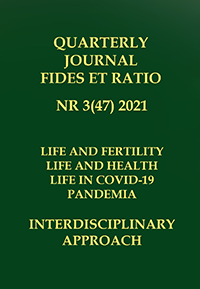Abstract
We are all called to live and improve the world for ourselves and others. Every person, even if he or she is a person with a disability, and with an impaired ability to perceive and understand, is a fully human subject who has an inalienable right to life and development, a right that belongs to every human being. A human being always has his or her dignity and a particular, unquestionable value. The most complete community for every human being is the family. It is the foundation of a fulfilling life, even for a child with such serious dysfunctions as ASD or Down syndrome. Having a child with ASD, or a child with Down syndrome, undoubtedly causes difficulties for the whole family in many areas. Social and cultural changes can affect how a family with a child with ASD or Down syndrome works. Thus, they may affect difficult parenting: motherhood or difficult fatherhood. At the same time, there is still a lack of research and analysis devoted to such families, to the perceived positive changes in the family system as a whole, and in the families themselves. The aim of this analysis is to try to answer the question of what attitudes and values parents of children with ASD and Down syndrome present. The research used the Attitudes Towards Disabled Persons Scale, the Attitudes Towards Disabled Persons Questionnaire and the Axiological Questionnaire by A. Sękowski. The research conducted using a diagnostic survey confirms that families characterised by a high level of moral and religious values present positive attitudes towards people with disabilities, including children with Down syndrome and ASD. Maximum assistance and support should be provided to families with a child with ASD and Down syndrome, in order to enable optimal development of children with ASD and Down syndrome in psychomotor and intellectual development by accepting and stimulating their subjectivity, and securing a space full of love and empathy.
References
Aksamit, D. (2018). Bycie razem – w cieniu głębokiej niepełnosprawności intelektualnej dorosłej córki, dorosłego syna (w:) E. Górnikowska-Zwolak (red.) Kobiety z nie- pełnosprawnością i wobec niepełnosprawności: zagadnienia edukacji i socjalizacji, 157-169, Katowice: UŚ.
Auliffe, Mc., T., Thomas, Y., Falkmer, T., Cordier, R. (2019). The experiences of mothers of children with autism spectrum disorder: Managing family routines and mother’s health and wellbeing, Australian Occupational Therapy Journal, 66 (1), 68-76.
Attwood, T. (2013). Zespół Aspergera. Kompletny przewodnik. Przekład A. Sawicka- Chrapkiewicz, Gdańsk: Wyd. Harmonia.
Banasiak, A. (2020). Dylematy rodziców dorastających osób z autyzmem (w:) A. Banasiak, E. Replewicz (red.), Edukacja opieka i wsparcie osób z niepełnosprawnością i ich rodzin, Częstochowa: UHP.
Barłóg, K. (2020). Sytuacja w systemach rodzinnych z dzieckiem z ASD w świetle modelu kołowego Davida H. Olsona, Rzeszów: Wyd. UR.
Currenti, S. A. (2010). Understanding and determining the etiology of autism, Cellular and Molecural Neurobiology, 30, 161-171.
Chrostowska, B. (2018). Co można własnymi siłami? Przykład aktywności Samopomocowej Grupy Rodziców i Opiekunów Osób z Autyzmem i Zespołem Aspergera z Olsztyna, Niepełnosprawność. Dyskursy Pedagogiki Specjalnej, 31, 87-99.
Chrzanowska, I. (2015). Pedagogika specjalna. Od tradycji do współczesności, Kraków: Impuls.
Drabata, A. (2019). Doświadczenia matek dzieci ze spektrum autyzmu w obliczu wielogłosowości wiedzy i praktyk dotyczących autyzmu, Szkoła Specjalna, LXXX (5), 340-351.
Gosztyła, T., Prokopiak, A. (2017). Poczucie osamotnienia u rodziców dzieci z zaburzeniem ze spektrum autyzmu oraz dzieci z niepełnosprawnością intelektualną, Psychoterapia, 3 (182), 81-82.
Jaranowska, A. (2016). Analiza temporalna doświadczonych przeżyć i otrzymywanego wsparcia przez rodziców dzieci z autystycznego spektrum zaburzeń, Niepełnosprawność. Dyskursy pedagogiki specjalnej, 23, 224-237.
Kiliszek, E. (2019). Rodzina wobec zagrożeń. Rodzina wobec szans. Socjopedagogika rodziny. Studium rodziny pełnej, Warszawa: Difin.
Kostiukow, A., Strzelecki, W., Poniewierski, P., Samborski, W. (2019). The estimation of the functioning of familes with ASD, AiMS Public Health, 6 (4), 587-599.
Niedbalski, J. (2019). Implementing a parental role and construing the identity of the parent of a child with intellectual disability, Studia Socjologiczne, 3, 135-169.
Pawlikowska, J., Maciejewska, O. (2018). Funkcjonowanie rodziny z dzieckiem ze spectrum autyzmu. Opieka i terapia, Zeszyty Pracy Socjalnej, 23 (2), 133-148.
Raaya, Alon. (2019). Social support and post-crisis growth among mothers of children with autism spectrum disorder and mothers of children with Down syndrome, Research in Developmental Disabilities, 90, 22-30.
Szmyd, K. (2017). Wartości i antywartości. W stronę szkoły aksjologicznej uniwersalnej, Kultura. Przemiany. Edukacja. Myśl o wychowaniu. Teorie i zastosowania edukacyjne, 5, 113-114.
Sozańska, A. (2016). Miłość silniejsza niż ból: macierzyństwo i ojcostwo rodziców dzieci niepełnosprawnych intelektualnie, (w:) B. Płonka-Syroka, A. Szlagowska (red.), Miłość niemożliwa, 155-184, Wrocław: Arboretum.
Wrona, S., Wrona, K. (2016). Coping with stress and social network among parents participating in the process of early intervention, Psychiatria i Psychologia kliniczna, 217-224.

